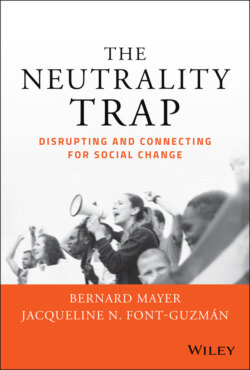Читать книгу The Neutrality Trap - Bernard S. Mayer - Страница 18
Disrupting for What: A Guiding Vision
ОглавлениеDr. King's Beloved Community is a global vision in which all people can share in the wealth of the earth. In the Beloved Community, poverty, hunger, and homelessness will not be tolerated because international standards of human decency will not allow it. Racism and all forms of discrimination, bigotry, and prejudice will be replaced by an all‐inclusive spirit of sisterhood and brotherhood. In the Beloved Community, international disputes will be resolved by peaceful conflict‐resolution and reconciliation of adversaries, instead of military power. Love and trust will triumph over fear and hatred. Peace with justice will prevail over war and military conflict.
—The King Center, n.d.
Democratic socialists believe that both the economy and society should be run democratically—to meet public needs, not to make profits for a few. To achieve a more just society, many structures of our government and economy must be radically transformed through greater economic and social democracy so that ordinary Americans can participate in the many decisions that affect our lives …
Democratic socialists do not want to create an all‐powerful government bureaucracy. But we do not want big corporate bureaucracies to control our society either. Rather, we believe that social and economic decisions should be made by those whom they most affect.
—Democratic Socialists of America, 2020
Social movements are often accused of being clearer about what is wrong and must change than about their vision for the future. This is mostly an undeserved criticism because it's impossible to know precisely how large‐scale systems will reorganize or to predict the future. We have to start with an understanding of what is not working now. Nonetheless, the development of a sense of what kind of society or world we want is essential to powerful change efforts, as is a roadmap for how to get there.
During the first half of the 20th century (and earlier), progressive movements were often motivated by a vision of society founded in socialist ideology. But, particularly in the United States, socialism (mostly unfairly) became associated with support for authoritarian regimes and with intrusive governmental bureaucracies. For much of the last 50 years, socialist ideology has not provided the motivating vision it once did. However, more recently, especially with the presidential campaigns of Bernie Sanders, the ideology of Democratic Socialism has seen a revival. Nonetheless as seen in the last US election, associating a cause (universal healthcare or the Green New Deal, for example) or a politician with socialism continues to be an effective tactic for those seeking to resist change.
Martin Luther King's vision of a Beloved Community has been an important source of strength for the civil rights and Black Lives Matter movements. The Beloved Community provides a picture of a non‐exploitative, nonviolent society, but it says little about the social, political, and economic arrangements that would actualize and sustain this vision. Dr. King believed that a radical commitment to nonviolence and social justice was the path to putting this vision into practice.
There has been no shortage of other contending visions and ideologies: anarchism, liberation theology, radical feminism, and communitarianism, to name a few. It's not our purpose to suggest what vision should or will take hold. Our sense is that ultimately some of the values and ideas of many of these ideologies will have to be part of the long‐term vision of progressive movements if they are to address the challenges we face at their most fundamental level.
What seems clear is that having a hopeful but realistic vision of the world we are striving for, a vision that takes us beyond our immediate struggles or particular focus, is part of what makes fundamental change possible. Such a vision is more likely if we can point to societies that have had at least some success in walking down this road. We can look to social democratic systems (e.g. Sweden or Finland) or countries that have achieved some success in pursuing multiculturalism (e.g. New Zealand or Canada) as partial examples. But these are not perfect examples because they are culturally specific models that will not necessarily work in other contexts, are themselves flawed, and were not designed to deal with problems that are truly global in scale.
This lack of a clear and comprehensive vision for social movements is also in some respects a good thing. Rigid ideologies or movements that have attached themselves to the example of a particular society (China, Cuba, or the Soviet Union, for example) have failed to provide an effective vision, have been political failures, and most importantly have ended up being morally compromised.
Instead, we need to think of a long‐term vision as a process rather than an outcome. The search for a comprehensive vision that is consistent with our values, connected to our actions, and hopeful but also realistic is an essential part of effective social movements. Such a search must be iterative, informed by experience and values, based on a continuous effort to understand our social, political, and economic systems, and inclusive of diverse people and communities.
The following chapters look at both the obstacles we face and strategies we can employ to promote social change. The book focuses on three essential challenges, which together form the steppingstones for system change: productive approaches to conflict engagement, deepening conflict, and system disruption. We start by considering a significant ideological cultural obstacle posed by the intellectual foundation that informs the work of many professions and institutions, including that of conflict interveners and the justice system—the ideology of neutrality.
